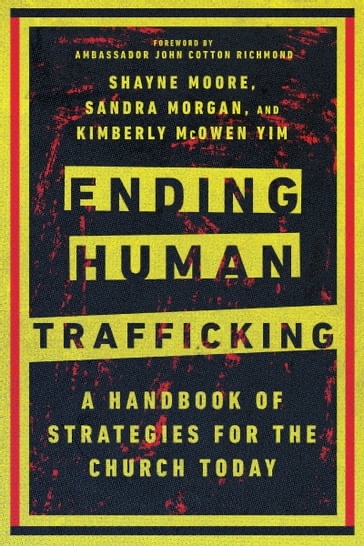What can churches do to help end human trafficking?
That is the question Ending Human Trafficking sets out to answer.
Written by veteran anti-trafficking activists Shayne Moore, Sandra Morgan, and Kimber McOwen Yim, the book outlines a “victim-centered trauma-informed approach” whose goal is to “prioritize people over process” because people are made in God’s image.
What is human trafficking? The authors cite the “internationally accepted definition” found in the United Nations Convention Against Transnational Organized Crime and the Protocols Thereto:
“ … the recruitment, transportation, transfer, harboring or receipt of persons, by means of the threat or use of force, or other forms of coercion, abduction, fraud, deception, abuse of power or vulnerability, or giving payments or benefits to achieve the consent of a person having control over another person, for the purpose of exploitation. Exploitation includes, at a minimum, the prostitution of others, or other forms of sexual exploitation, forced labor or services, slavery or similar practices, servitude or the removal of organs.”
It is worth citing this definition of length in order to correct the impression I have often found among my fellow churchgoers, who conflate human trafficking with sex trafficking. Human trafficking is much broader than sex trafficking, however. “Internationally,” the authors write, “64 percent of trafficking victims are in forced labor, approximately 20 percent are in sex trafficking, and another 16 percent are in state-imposed forced labor.”
Another misimpression I have often found among my fellow churchgoers, related to the first misimpression, is that human trafficking is a sexual sin, driven by the lust of johns. The legal definition and statistics show that it is more fundamentally an economic sin, driven by the greed of traffickers. As 1 Timothy 6:10 says, “the love of money is a root of all kinds of evil.”
Ending Human Trafficking argues that churches need to beyond merely ministering to victims in the aftermath of human trafficking and commit to preventing it from occurring in the first place. The authors structure their advice around five Ps that have been widely adopted by governmental and non-governmental anti-human trafficking agencies:
• Partnership: The goal is to share and develop multidisciplinary expertise and resources. It has a multi-agency focus.
• Prevention: The goal is to eliminate or reduce victimization risk. Its focus is on vulnerable populations.
• Protection: The goal is to empower survivor’s personal dignity, so the focus is on the survivor.
• Prosecution: The goal is to hold suspect(s) accountable, which means the focus is on the perpetrator of the crime.
• Policy: The goal is to support and sustain anti-human trafficking efforts. This has a broad human rights focus.
The authors add a sixth P to this mix: “prayer is the most important undertaking the church can take.” There is a spiritual warfare element to anti-human trafficking activism—greed is idolatry, after all (Ephesians 5:5). Confronting that evil requires supernatural assistance.
I strongly recommend Ending Human Trafficking to church leaders and Christian activists who want to take practical action to end human trafficking. It will correct many misconceptions, warn against counterproductive strategies, and show how to cooperate intelligently and prayerfully with others in the goal of preventing such evil from happening.
I close with the recommendation my late father, Dr. George O. Wood—then chairman of the World Assemblies of God Fellowship—provided for the book. Dad was a mentor of Sandra Morgan and her husband Jean and thought very highly of her work. Here’s what he said:
“Human trafficking—whether for labor or for sex—is modern-day slavery. It is an assault on the dignity of people created in God’s image, and Christians must oppose it. In this book, my good friend Sandra Morgan and her coauthors offer a six-point comprehensive strategy for churches to collaborate with others in the godly work of ending human trafficking. This is an eye-opening and helpful book.”
It is, indeed.
Book Reviewed
Shayne Moore, Sandra Morgan, and Kimberly McOwen Yim, Ending Human Trafficking: A Handbook of Strategies for the Church Today (Downers Grove, IL: IVP Academic, 2022).
P.S. If you liked my review, please click “Helpful” on my Amazon review page.

